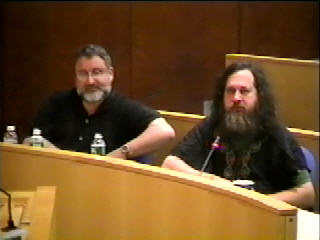06.28.16
Posted in Microsoft, Red Hat at 6:06 pm by Dr. Roy Schestowitz
Relying on mass deception using the media while blackmailing companies behind closed doors

Summary: Luna Mobile has just been extorted by Microsoft (using dubious software patents, as usual) for using Android/Linux, but Microsoft-influenced media carries on spreading the lie that “Microsoft loves Linux”
RED HAT’S own event has just been hijacked by Microsoft again (see articles below along with the comments) and Microsoft used Red Hat’s platform to call its proprietary (Open Core) platform “Open Source”, to say it “loves Linux” (the infamous old lie), and so on. On the other hand, Microsoft’s own booster Mary Jo Foley says that “Microsoft signs Android patent-licensing deal with Luna Mobile”. She insists that “Microsoft has signed an Android patent deal with Luna Mobile, even though its announcement of the arrangement never mentions the word ‘Android’.”
Yes, so much for love. It must love all that ‘protection money’ it is silently amassing. █
Related/contextual items from the news:
-
-
-
-
-
-
-
Microsoft starts proving its Linux love [Ed: As big a lie as it gets; when will it stop taunting Linux with patents then?]
-
-
-
-
-
-
-
-
-
-
-
-
Latest Microsoft Mechanics video shows Red Hat Linux running on Azure [Ed: Does anyone really believe (literally) Microsoft loves Linux ? All I see is Microsoft boosters and ghostwriters claiming such people exist.]
-
-
-
-
Permalink
 Send this to a friend
Send this to a friend
06.17.16
Posted in GNU/Linux, Red Hat, Ubuntu at 4:26 am by Dr. Roy Schestowitz
Or: why I hardly cover GNU/Linux news (with original articles) anymore

Summary: In an effort to trip each other up and in order to become the ‘industry standard’, Canonical and Red Hat hurt each other and alienate the media (what’s left of it)
TECHRIGHTS, with the exception of the daily links, does not cover GNU/Linux matters all that often. Not anymore. There’s a reason for this and it’s not just the growing role of software patents in the destruction/elimination of software freedom.
I wouldn’t be the first person to state that the GNU/Linux world can be harsh and brutal. People have free speech, which is absolutely fine (I’m a big opposer of censorship and self-censorship). But what happens when people cross the line of common sense and begin to personally attack writers and pundits? What happens when they do this on behalf of big and wealthy corporations? A lot of the abuse I received from the Mono crowd over the years (unimaginable abuse, comparing me even to a criminal) is ever more fascinating now that those very same people are Microsoft employees.
“A lot of the abuse I received from the Mono crowd over the years (unimaginable abuse, comparing me even to a criminal) is ever more fascinating now that those very same people are Microsoft employees.”I recently encountered or was the eyewitness of truly shameful attacks on Phoronix, both from developers and from sites like Reddit, which effectively blacklisted Phoronix, calling it “blogspam”. Reddit is full of censorship for those who don’t know it yet (our daily links have many articles about its political censorship too), but it’s rather unbelievable if not cynical when they block the whole of Phoronix (recently the subject of renewed debate over there and maybe a reversal/overturning of the ban, for the first time in a very long time).
The point I am trying to get across here is that it’s not easy to cover GNU/Linux news because there’s always someone, somewhere who isn’t happy. Thick skin is required. I hardly cover GNU/Linux matters (compared to past years), though it’s not because I’m offended or put off by personal attacks; it’s because I don’t always feel appreciated for the investigative work which I do. I generally snub any PR person or company spokesperson. I don’t trust them. I try to come up with an independent point of view; so do some journalists like Sam Varghese, who have earned nothing for that other than scorn and abuse.
I am not alone in this. Not many people are willing to speak out about it, perhaps fearing backlash. Consider Canonical with their disgusting blacklists of journalists who are not sucking up to Canonical and swallowing every ounce of Kool-Aid from Canonical, as pointed out not just by yours truly but also other bloggers/journalists (both privately and publicly, with those who do so privately fearing that these blacklists would treat them even more maliciously if they dared to rant).
“I try to come up with an independent point of view; so do some journalists like Sam Varghese, who have earned nothing for that other than scorn and abuse.”Red Hat is not much better by the way. The giant Linux firm is alienating people who often/always write out of passion, not for profit (financial gain) or for glory. Red Hat has a massive PR operation now (publicly and behind the scenes) and it’s not something which is pleasant to see because it reminds me of how Microsoft games the media, often bordering the unethical. When companies hire patent lawyers they tend to bring a lot of their (the latter’s) self-serving anti-etiquette and the same thing happens when companies hire PR people. Mass-mailing people is just one of their professional ‘skills’ and — at risk of saying something politically-incorrect — these tend to be women, preferably attractive women (this gives more impact to their work, along various different aspects beyond the scope of this post).
The other day I noticed a certain flamewar brewing between Red Hat and Canonical. They try to keep it on ‘low fire’, but it’s impossible to ignore the bigger picture.
openSUSE’s Twitter account, for example, wrote: “Of course kudos also go to http://flatpak.org . But canonical at least trying to behave and collaborate deserves respect” (that’s a polite way of saying that Fedora/Red Hat does not collaborate or does not deserve respect). Prior to that openSUSE mentioned Swapnil Bhartiya and said: “Kudos to @Canonical for working with other distributions on a new method of packaging applications #linux #respect https://twitter.com/swapnilbhartiya/status/743555291535519744″
“I soon learned of Fedora employees bashing the media wherever they could because some sites wrote about Canonical’s Snap initiative being an actual competitor to their Flatpak universal binary package.”OpenSUSE is trying not to take sides. They first retweeted Swapnil’s tweet saying “Kudos to Canonical for working with other distributions.” And then they say “Also kudos to http://flatpak.org” (as if someone from Fedora got in touch). In another tweet or a bunch of them we see what indicates that there is strong rivalry between Canonical and Red Hat. It makes us bloggers/journalists feel like collateral damage (or ‘tools’), and unlike these people who push us around, we don’t receive huge salaries for our work. For me, reporting is a purely voluntary activity with no financial gain. I decided to ask around and find out what the heck was going on, having seen how Red Hat strong-armed some distributions into embracing the “Red Hat way” — to the point where Canonical had to abandon some of their own projects.
I soon learned of Fedora employees bashing the media wherever they could because some sites wrote about Canonical’s Snap initiative being an actual competitor to their Flatpak universal binary package.
As a reminder for those who are not paying close enough attention, Flatpak is loosely connected to Systemd, probably Red Hat’s most controversial ‘lock-in’ at the moment. On the other hand, Canonical is trying to push its own ‘standards’, which it can probably do given its dominant position on the desktop (and almost on the server as well).
“Red Hat was apparently so pissed off by the whole thing that one Fedora employee (i.e. Red Hat) started chastising reporters.”One interesting fact I have learned is that several days ago Canonical basically spoon-fed some sites a so-called ‘scoop’, in order to ‘generate’ some coverage for Snaps. Not so atypical or unexpected from Canonical, but there we go…
Red Hat was apparently so pissed off by the whole thing that one Fedora employee (i.e. Red Hat) started chastising reporters. That employee was James Hogarth. He baselessly started accusing Softpedia on the fedora-devel mailing list, claiming that Softpedia said, to quote, “Canonical state that they have been working with Fedora developers…” (this was not said at all). There’s this reply from Michael Catanzaro of the GNOME Project. At that time, he took James Hogarth’s words for granted, assuming that Softpedia claimed something it didn’t. Here is a later response from him:
Just for the record… the Softpedia article doesn’t actually say “Canonical state that they have been working with Fedora developers to make this the universal packaging format.” It does say they’ve been “working for some time with developers from various major GNU/Linux distributions” and that “the Snap package format is working natively on popular GNU/Linux operating systems like [...] Fedora [...],” so it’s clear why there was confusion, but it doesn’t say that they’ve been working with Fedora specifically.
Later on Hogarth cited his colleague, Adam Williamson, with a rather offensive piece (“Canonical propaganda department”), adding “AdamW responds to the Canonical Snappy PR piece.”
“But either way, accusing publications of saying something they did not say is unfair, and it reflects badly on the community as a whole.”Michael Hall from Canonical said on Reddit that they talked with some Fedora people at some point (Michael Hall’s statement here is equally informative). But either way, accusing publications of saying something they did not say is unfair, and it reflects badly on the community as a whole.
I have a personal grudge with Canonical over how they treat media, having witnessed online friends becoming victims of theirs, but I didn’t think Red Hat would stoop down to this level as well. What we are basically witnessing here is a bunch of Red Hat (‘Fedora’) employees attacking the media over Snap/Flatpak war. They want the media to take sides and get upset that the media isn’t telling the story the way they want it to.
This isn’t some kind of epic rant from me, just an observation of something that I noticed in the past. If Softpedia folks and Phoronix (Michael Larabel) can be treated like enemies because they attempt to amicably — without controversy — cover GNU/Linux news, then what hope is there for more outspoken bloggers like myself? It’s sad as it’s not just one case; the above is symptomatic of something that has been going on for years and that’s why I don’t cover Linux issues such as Systemd. It’s almost suicidal. It’s nothing but trouble. Self-censorship ensues.
“They’ll need to learn to respect the media or earn no respect in return.”Why do journalists need to be abused for attempting to cover the news, even when they cover it correctly? There’s also this on LWN (Jimbob0i0 is James Hogarth) where, again, it’s said that Softpedia claimed something it didn’t.
Red Hat needs to respect people’s views, even when these views are not correct (in this particular case these views are correct). They’ll need to learn to respect the media or earn no respect in return. They need to work better with the media or have no media at all, except that which they pay for, e.g. their opensource.com propaganda rag (it spends much of its time just peddling a book that helps pretend Red Hat is “open”, based on the CEO’s words).
The above scenario is corrosive and harmful to the relationship between Free software developers and media. Why are they all still wondering why the GNU/Linux ecosystem is not united? Why the fragmentation? Why some many hundreds of distros? That’s why. █
Permalink
 Send this to a friend
Send this to a friend
11.30.15
Posted in FSF, Microsoft, Patents, Red Hat at 6:56 am by Dr. Roy Schestowitz

Photo source: Professor Conrad Johnson
Summary: Founder of Free software and author of the GPL (respectively) comment on what Microsoft and Red Hat have done regarding patents
WE FINALLY GOT some feedback regarding the baffling patent agreement which seemingly affects every user of GNU/Linux. We got this feedback from Stallman and (indirectly) Moglen, two of the Free software world’s most prominent individuals, especially when it comes to the GPL (GNU Public Licence/License).
Coverage of the Red Hat-Microsoft patent agreement can be found in [1, 2, 3, 4, 5, 6, 7, 8, 9, 10, 11, 12, 13]. We sought feedback from Red Hat and spoke to low(er) level people for weeks, without ever hearing back from high-level management. After weeks of trying and waiting we ended up asking legal professionals to examine whatever legal contracts — even if under NDA or some other secrecy clauses that legally-binding deals may have — were involved. We first wrote to the FSF as follows:
Dear FSF licensing folks,
As discussed earlier in IRC (freenode), I have been pursuing answers from Red Hat regarding an urgent matter. I previously interviewed their CEO regarding patents and last week I spoke to a fairly senior person from Red Hat (unnamed for his own protection), for the third time this month. I wrote about 10 articles on this subject and it led to others writing about it as well, including some prominent bloggers.
“We need to understand what Red Hat agreed on with Microsoft on as Microsoft can use this behind closed doors against other companies, for pressure/leverage.”To put it concisely, Red Hat signed a deal with Microsoft which not only involved technical work but also what they call patent “standstill”. Who is this “standstill” for? Apparently Red Hat and its customers. I strongly doubt, especially in light of Alice v. CLS Bank, that a “standstill” should be needed. Red Hat does not threaten to sue Microsoft, whereas Microsoft did in the past threaten Red Hat (even publicly). This leaves those outside Red Hat in an awkward position and ever since this deal I have taken note of at least two companies being coerced by Microsoft using patents (over “Android” or “Linux” [sic]) or sued by one of its patent trolls, e.g. Intellectual Ventures. This isn’t really a “standstill”. It’s more like the notorious “peace of mind” that Novell was after back in 2006.
Red Hat has also admitted to me that it is still pursuing some software patents in the USPTO — a fact that does not surprising me, especially given the soaring market cap of RHT and the growing budget. This serves to contradict what people like Rob Tiller say to the courts; it shows double standards and no principled lead by example.
“The analysis and the voice of the FSF may be needed at this stage.”I have asked the FSF’s Joshua if it had looked into the patent agreement between Red Hat and Microsoft. Their lawyers in this case, Mr. Piana and Mr. Tiller (probably amongst others whom we don’t know about yet), would probably claim and even insist that it’s GPL-compatible, but the wording in the FAQ make it look exclusionary and there’s no transparency, so one cannot verify these claims.
We need to understand what Red Hat agreed on with Microsoft on as Microsoft can use this behind closed doors against other companies, for pressure/leverage. I am genuinely worried and fellow journalists who focus on GNU/Linux (Sean Michael Kerner for instance) tell me that they are too.
The analysis and the voice of the FSF may be needed at this stage. I have politely urged Red Hat for a number of weeks to become more transparent, whereupon some in the company said they had escalated these requests, but evidently nothing is being done, hence I feel the need to turn to the FSF.
I would gladly provide additional information that I have upon request.
With kind regards,
“In concrete terms,” Stallman responded, “what did they agree to do?”
“It is effectively a technical collaboration,” I told him, “which also involves a ceasefire regarding patents.”
“It is impossible to discuss whether it is good or bad,” he said, “until we know what it is.”
“We know too little about the patent aspects,” I explained.
Referring to Red Hat’s FAQ, Stallman said that I “seem[ed] to be talking about text I [Stallman] have not seen.”
To quote the relevant part for readers:
4. Does the new partnership address patents?
Red Hat and Microsoft have agreed to a limited patent arrangement in connection with the commercial partnership for the benefit of mutual customers.
The heart of the arrangement is a patent standstill that provides that neither company will pursue a patent lawsuit or claim against the other or its customers, while we are partnering. Neither company acknowledged the validity or enforceability of the other’s intellectual property; it is not a patent license or a covenant not to sue and no payment was made or will be made for intellectual property.
The partnership is between commercial companies related to their common customer offerings, spurred by customer demand. Both parties carefully designed for FOSS licensing compliance in building the arrangement and each party’s relationship to the FOSS community stands on its own.
“Covering only customers and not downstream users,” Stallman said, “it is not a good thing, but it may not do a lot of harm.”
“Covering only customers and not downstream users is not a good thing, but it may not do a lot of harm.”
–Richard StallmanI responded by saying “I hope that a thorough look into it will help remove uncertainty and get some hard answers. Right now it’s too vague or me and some fellow developers to conclude anything from.”
Days ago I asked whether “there been any progress on this case” because “I just want[ed] to be sure that licensing is looking for answers regarding the matter.”
Stallman, by that stage, seemed to have already spoken to a colleague and friend. “Eben Moglen,” he explained, “told me it doesn’t violate GPLv3. Other than getting that information, I don’t know what progress we could hope for.”
Well, as GPLv3 co-authors, their take on this sure counts. We therefore got an answer without taking a look at the contract itself (they had made access to it highly privileged information).
Assuming the case won’t go any further than this, we believe it helps set the record straight on the Microsoft-Red Hat situation. █
Permalink
 Send this to a friend
Send this to a friend
11.20.15
Posted in GNU/Linux, Google, Microsoft, Patents, Red Hat at 7:29 am by Dr. Roy Schestowitz

Summary: The reaction of patent profiteers to scope/boundary restrictions, the FRAND lobby by Microsoft’s longtime front group, FRAND matters in Korea (affecting Android), Google’s response to patent threats, and Red Hat still keeping quiet about its patent agreement with Microsoft
THERE is nothing exceptionally surprising in the news today, so we are going to focus on the EPO, which is in a very poor state right now. The management is so frail that the only language it understand is aggression. We shall write several articles about it this afternoon. Before we start, however, here is a potpourri of updates about the patent situation and how it relates to Free/Open Source software (FOSS).
“When they say “patent world” they mean the corners of the world where people pursue patents — those who try to profit from patents without necessarily creating anything.”Patent lawyers’ Web sites are still bemoaning the death of many software patents in the United States (death by Alice). One of the better known ones says that “many software patent holders must feel ─ like they were walking along merrily through the woods when they fell suddenly into a blinding, winding rabbit hole. Where once their patents stood bold and tall, they have now shrunk to a seemingly indefensible size. Whether they can defend their so-called “abstract” patents in court is now as unclear as the Mad Hatter’s riddles. The famed Alice decision has certainly left many in the patent world wondering.”
When they say “patent world” they mean the corners of the world where people pursue patents — those who try to profit from patents without necessarily creating anything.
Remember FRAND lobbying in Europe back in the days (nearly a decade ago)? Well, ACT‘s new face just got mentioned by another who was paid by Microsoft, and also regularly pushes along the FRAND front (against FOSS, relying on Korea at the moment). “ACT | The App Association,” he explained, “has announced a new web resource for innovators, policy-makers, and academics. It’s called All Things FRAND and supported by significant players including Cisco, Intel, and Microsoft. ACT is headquartered in the U.S. but also quite active abroad.”
Well, historically ACT had been little more than a Microsoft lobbyist. Then there is CCIA, which seemingly changed its position after being paid a lot of money by Microsoft. CCIA‘s Matt Levy, who now runs an anti-trolls site, has just released this new video. Don’t expect Levy to criticise CCIA’s funders, which include Microsoft. This monopolist, Microsoft, is acting in ways that resemble patent trolls.
“Well, right now many of the “bad guys” also use FRAND against Android, which Google distributes as Free/Open Source software.”Google, in the mean time, claims to be against patent trolls. As IEEE Spectrum put it some weeks ago: “Google’s Patent Purchase Promotion, which the company says received “thousands” of submissions during a three-week window, may prompt similar experiments in keeping patents out of the hands of what it considers the bad guys of intellectual property.”
Well, right now many of the “bad guys” also use FRAND against Android, which Google distributes as Free/Open Source software.
In other news, we are still pressuring Red Hat to reveal what it did with Microsoft regarding patents. We haven’t forgotten about this and we are not going to give up. The Free/Open Source software world deserves some answers. █
Permalink
 Send this to a friend
Send this to a friend
11.17.15
Posted in Microsoft, Patents, Red Hat at 8:00 am by Dr. Roy Schestowitz
Still in pursuit of answers from the “Open Organization” [sic]

Summary: Quick progress report about the effort to convince Red Hat to explain its patent standstill — whatever that practically means — with Microsoft
IN THE political spheres or most political media it is widely recognised that in order to discourage certain policies and certain types of behaviour one might need to shame those who propose or exercise any such policy or action, respectively. This, for example, is why we criticise proponents of software patents and even Red Hat’s patent agreement with Microsoft. The example they give to others is dangerous and without public challenge it can carry on and even expand.
“The example they give to others is dangerous and without public challenge it can carry on and even expand.”Red Hat should be based in Raleigh, not Red Mond [sic], where Red Hat now sends its engineers to work under Microsoft leadership while receiving salaries from Red Hat. We had a long chat about this with someone from Red Hat last night. We still hope that Red Hat will decide to do the right thing. Like Novell’s Cambridge lab, which it used along with Microsoft to promote Microsoft’s agenda, now we have Red Hat staff sharing space with Microsoft staff. Microsoft is a proponent of software patents and still insists that Linux players should pay Microsoft for patents. So how can one reconcile or compromise? In our Open Letter to Red Hat’s new CEO (Jim Whitehurst) 8 years ago we told him that it is “hard to name companies that have benefited from a Microsoft pact” (this is still true).
We will continue to wait and give Red Hat an opportunity to explain what was done with Microsoft regarding patents. We encourage others to ask Red Hat those questions as well. If public pressure is sufficient to influence Red Hat’s PR/marketing experts, Red Hat will decide to open up. For a company steered by shareholders it all boils down to money and reputation. █
“What we [Novell and Microsoft] agreed, which is true, is we’ll continue to try to grow Windows share at the expense of Linux. That’s kind of our job. But to the degree that people are going to deploy Linux, we want Suse Linux to have the highest percent share of that, because only a customer who has Suse Linux actually has paid properly for the use of intellectual property from Microsoft. And we took a quota, you could say, to help them sell so much Suse Linux. That’s part of the deal. We are willing to do the same deal with Red Hat and other Linux distributors, it’s not an exclusive thing. But after a few years of working on this problem, Novell actually saw the business opportunity, because there’s so many customers who say, ‘Hey look, we don’t want problems. We don’t want any intellectual property problem or anything else. There’s just a variety of workloads where we, today, feel like we want to run Linux. Please help us Microsoft and please work with the distributors to solve this
problem, don’t come try to license this individually.’ So customer push drove us to where we got.”
–Steve Ballmer
Permalink
 Send this to a friend
Send this to a friend
11.16.15
Posted in Microsoft, Novell, Patents, Red Hat at 5:18 pm by Dr. Roy Schestowitz
Systemd to be used for technical and support leverage in the same way Mono was?

Credit: unknown (Twitter)
Summary: Red Hat’s current management, which technically liaises (more deeply over time) with Microsoft, agrees on patents, works with the NSA, and increasingly deviates from the UNIX way (while becoming more secretive, except the openwashing), inevitably reminds us of Novell
Microsoft and the board- or shareholders-driven Red Hat now seem more and more like Microsoft and Novell, based on some of the latest reports and even press releases like this one [PDF].
“The Microsoft/Red Hat partnership calls for a Red Hat engineering team to actually move to Redmond,” to quote a new report. [1]
“And don’t forget the patent agreement that they still refuse to tell us more about.”Mirroring the Microsoft-Novell ‘special relationship’, there is a lot of technical integration too. The men in suit “said that in the coming months Red Hat Enterprise Linux images will be enabled for on-demand billing directly in its marketplace.” Billing by who? Microsoft? Red Hat? It’s complicated. And don’t forget the patent agreement that they still refuse to tell us more about [1, 2, 3, 4, 5, 6, 7, 8, 9, 10].
Jono Bacon, from GitHub and Red Hat’s “Open Organization” [sic] marketing campaign, defends the companies’ new relationship (as he would defend his former employer, Canonical, as well). Citing a sort of Microsoft proxy and a new Red Hat partner (Black Duck), he frames this relationship as necessary and recalls that “Microsoft went a step further with then-CEO Steve Ballmer describing the poster-child of the open source revolution, Linux, as “a cancer that attaches itself in an intellectual property sense to everything it touches.”
“Red Hat is living in a dream if it genuinely believes that a deal with Microsoft will leave them better off than Linspire or Novell.”Well, based on Nadella’s actions against Samsung, Kyocera, and Dell (there are more examples), he too views Linux as “a cancer that attaches itself in an intellectual property sense to everything it touches.” Nadella insists on still using patents against Linux, and against Android in particular (using patents pertaining to the kernel, Linux).
Under Nadella’s management, Microsoft is even trying to delete Android from phones (we first took note of this at the beginning of this year and later on) or even absorb its software into Windows — a strategy which Microsoft reportedly did in fact consider [2]. It’s like a derivative of the famous “embrace, extend, extinguish” strategy. Under Nadella there was also further lockdown of UEFI, impeding or making impossible installation of GNU/Linux on PCs that come with Microsoft’s unpopular spyware.
Red Hat is living in a dream if it genuinely believes that a deal with Microsoft will leave them better off than Linspire or Novell. Or maybe it can leave Red Hat just better off than everyone else in the GNU/Linux world. Red Hat’s patent agreement with Microsoft, concurrent with Microsoft attacking Android (with software patents), is truly problematic and we will escalate if Red Hat does not respond to us or becomes transparent by the end of this month. A lot of people want answers. The “Open Organization” [sic] ignores these people. It’s inherently antithetical to players in a community of developers. █
Related/contextual items from the news:
-
The Microsoft/Red Hat partnership calls for a Red Hat engineering team to actually move to Redmond to provide joint technical support for Red Hat Enterprise Linux workloads running in the Microsoft Azure public cloud and on its hybrid cloud offerings. That ensures that the companies will have closely tied cloud computing goals.
-
Microsoft has sidelined its plan to allow Windows 10 devices to run Android apps before it could do any serious damage, according to a report.
Daniel Rubino at the Windows Central blog gathered some convincing evidence that Microsoft’s Project Astoria has been wound down, while the runtime allowing the Android-on-Win10 magic to work has disappeared.
Permalink
 Send this to a friend
Send this to a friend
11.14.15
Posted in Google, Microsoft, Patents, Red Hat, Servers at 12:06 pm by Dr. Roy Schestowitz
On carving out parts of the market using patent monopolies…
“Inventive people [at Novell] write more software patents per capita than anywhere else.”
–Jeff Jaffe, Novell’s CTO before these patents got passed to CPTN (Linux foes)
Summary: The use of a patent portfolio in the Free software world for divisive and discriminatory purposes, as demonstrated by Red Hat in servers and BlackBerry in phones
IN OUR previous articles which mentioned Microsoft’s patent agreement with Red Hat [1, 2, 3, 4, 5, 6, 7, 8, 9] we noted that:
- The patent “standstill” (implies temporary and falsely insinuates there was a two-way war) applies only to Red Hat and its customers, unless Red Hat can prove otherwise;
- The deal does not shield Red Hat and and its customers from satellites of Microsoft.
“We both know we have very different positions on software patents. We weren’t expecting each other to compromise.”
–Paul Cormier, Red HatWell, we are still waiting for Red Hat’s lawyers to speak out (Tiller and Piana were involved in this) or for Red Hat’s management to get back to us (if it decides to). They need to go “open” (like an “Open Organization” [sic]), or at least clarify in some other way what exactly Red Hat did with Microsoft regarding patents. The FAQ is far too vague and it raises more questions than it answers. If we don’t hear some time later this month, we shall assume that Red Hat is hiding something and we’ll rally Free software people (urging them to comment on this subject), set up a public petition, etc. Transparency is extremely important here. This new article quotes Paul Cormier, Red Hat’s president for products and technologies, as saying: “We both know we have very different positions on software patents. We weren’t expecting each other to compromise.”
Well, both are applying for software patents, so it’s not clear what he meant by that. Also, they compromised only among themselves; what about other entities that use the same software as Red Hat does? Are they too enjoying a patent “standstill”? Probably not. Only says ago Microsoft extorted — using patents — yet another company that was using Linux (Android was mentioned in the announcement).
“Nothing prevents Intellectual Ventures from going after Red Hat just like Acacia repeatedly did, so it’s a fool’s settlement.”What has Red Hat really achieved here? It was a selfish deal and the inclusion of patents in it was totally spurious; it does a lot more harm than good. Ian Bruce, Novell’s PR Director, once said that the Novell/Microsoft package “provides IP peace of mind for organizations operating in mixed source environments.”
Meanwhile, the Microsoft-friendly media gives a platform to the world’s biggest patent troll, Intellectual Ventures, without even calling it “patent troll”. This troll recently sued a lot of companies that distributed Linux. Nothing prevents Intellectual Ventures from going after Red Hat just like Acacia repeatedly did, so it’s a fool’s settlement.
“Remember that BlackBerry habitually speaks about using patents for revenue and for market advantage.”Speaking of potential patent dangers to Linux, recall that BlackBerry pays Microsoft for patents (including FAT, which relates to TomTom/Linux) and recall our articles about BlackBerry potentially becoming a troll [1, 2, 3, 4]. Some people’s loyalty to this Canadian brand and its newfound support for Android can blind them to the risk which BlackBerry remains, especially because of its patents stockpile.
This new article [1, 2] serves to remind us that BlackBerry still has “Software And Patent Monetization” in mind (we covered this some weeks ago, quoting the CEO). This means that, failing the strategy with Priv and Venice (BlackBerry’s Android devices and Linux-centric strategy), it could end up like Sony-Ericsson, suing Android players whilst also selling their own (unsuccessful) Android handsets.
“BlackBerry is proprietary to the core.”Remember that BlackBerry habitually speaks about using patents for revenue and for market advantage. Also remember that BlackBerry is not — at least not yet — an Android company. BlackBerry is proprietary to the core. “The QNX division could also face higher competition from open source software such as Linux,” wrote a financial site, “which many customers find more flexible and economical, limiting its potential in the burgeoning IoT and connected device market. For instance, Tesla reportedly uses Linux for its Model S sedan.”
Don’t be too shocked if BlackBerry eventually sells its patents to hostile actors, asserts them against competitors that use Android, or uses aggressive lawyers to compel various OEMs to remove features from their Android devices (both hardware and software features). █

“I’ve heard from Novell sales representatives that Microsoft sales executives have started calling the Suse Linux Enterprise Server coupons “royalty payments”…”
–Matt Asay, April 21st, 2008
Permalink
 Send this to a friend
Send this to a friend
11.12.15
Posted in Microsoft, Patents, Red Hat at 2:58 pm by Dr. Roy Schestowitz
Lessons for Red Hat

Summary: Red Hat’s mysterious and seemingly very selfish patent deal with Microsoft continues to float (or reverberate) because of the fate of companies in a similar position
IT has been nearly a week since Red Hat’s poor clarification (FAQ) regarding its patent agreement with Microsoft [1, 2, 3, 4, 5]. Only a few days later Microsoft extorted yet another company for using Linux and since our detailed media survey there have been yet more articles about it. There are examples from earlier today [1-3], yesterday [4], two days ago [5], and prior days (more articles are still surfacing from that time, e.g. [6-9)). As we pointed out earlier today, we are still waiting to hear back from Red Hat (this afternoon we were told it had been escalated to management). We hope that this kind of patent approach won’t spread to entities like Mozilla because Red Hat has pretty much become part of the problem. It is now filing patent applications for software (any claims of opposition to software patents would be hypocritical) and it is signing what seems like exclusionary patent deals with Microsoft (it’s still kept secret, so it’s hard if not impossible for Red Hat to prove otherwise).
“It’s not the same as it was back in the days of the FireStar settlement.”After the patent deal with Microsoft Red Hat is still exposed to patent trolls like the Microsoft-connected Acacia. Red Hat has already been sued by it several times before (Novell too was sued by Acacia after it had signed the Microsoft patent deal). Red Hat also made secret deals (it agreed to pay Acacia), whereupon we lost hope and trust in Red Hat's misguided patent strategy. It’s not the same as it was back in the days of the FireStar settlement [1, 2, 3]. Red Hat is growing up and just like Google (with Android) it is increasingly being run by lawyers, who probably advise it to hoard patents of its own and sign patent deals where it’s financially beneficial to Red Hat’s shareholders (regardless of the impact on the Free software community).
“If Red Hat genuinely believes that Red Hat and its customers now have patent “standstill”, then it obviously didn’t do its homework regarding Microsoft’s satellites.”Now, recall Canon’s recent patent deal with Microsoft. Also remember that both companies pressured the EPO to treat large corporations differently when it comes to patent examination. Did Canon really think that it would have patent peace after signing a deal with Microsoft? Based on this latest docket report, Intellectual Ventures attacked Canon and its “Image Scanning Patent [is] Not Invalid Under 35 U.S.C. § 101″ (Alice). To quote the docket report, Intellectual Ventures I LLC et al v. Canon Inc. et al, 1-13-cv-00473 (DED November 9, 2015, Order) (Robinson, J.): “The court denied defendant’s motion for summary judgment that plaintiffs’ image scanning patent was invalid for lack of patentable subject matter and found that the claims were not directed toward a patent-ineligible concept.”
If Red Hat genuinely believes that Red Hat and its customers now have patent “standstill”, then it obviously didn’t do its homework regarding Microsoft’s satellites. It didn’t even bother thinking about satellites like Acacia, which sued not only Red Hat but also Novell, only months after Novell had boasted patent “peace of mind” with Microsoft. █
Related/contextual items from the news:
-
-
-
-
-
-
-
-
-
Permalink
 Send this to a friend
Send this to a friend
« Previous entries Next Page » Next Page »

























 Content is available under CC-BY-SA
Content is available under CC-BY-SA